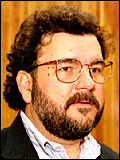CRIME-NEWS REPORTERS DEMAND RESPECT
Journalists Craft Battle Plan at D.C. Conference
November 11, 1998
By Hoag Levins

|
|
Photo: Hoag Levins
David Krajicek, CJJ vice president.
|
|
WASHINGTON, D.C. (APBnews.com) -- Although crime-related stories make up as much as 35 percent of newspaper content and 50 percent of local TV news broadcasts, crime reporting itself has been viewed as a low-status job by many of those same news organizations.
But the nation's police reporters are starting to fight back, demanding more respect from both publishers and peers. Their new advocacy group -- Criminal Justice Journalists (CJJ) -- opens its second national conference today in the Marriott Wardman Park Hotel.
"We want to be a voice for those who want a more professional, in-depth approach to criminal justice system-related reporting," explained David Krajicek, a veteran journalist who is also the author of the 1998 book , SCOOPED! Mass Media Miss Real Story on Crime While Chasing Sex, Sleaze and Celebrities.
Catfish of the newsroom
"Crime reporters have long been like the catfish of the newsroom -- the bottom feeders," explained Krajicek, a founder and vice president of CJJ.
"The police-and-crime beat is often considered to be an entry-level position that must be endured by young reporters for 18 months before they move on to something more 'serious,'" explained the 42-year-old former chief of the New York Daily News' six-person police bureau.
"Right now the way it works in many newsrooms," he said, "is that a young reporter arrives right out of college and the editor or producer points him or her toward the police station, saying, 'Go see what you can find.' The greenhorn gets no training or guidance; doesn't know a UCR from a VCR; and wouldn't know what a 'patrol strategy' was if it bit them on the butt."
Widespread criticism of crime reporting
Many media critics have pointed out that the high rate of churn and low level of experience among crime-news reporters results in weak, unsophisticated and disjointed coverage of important criminal justice issues and events.
Two years ago, after attending a weekend seminar about the sad state of U.S. crime reporting, Krajicek teamed up with Ted Gest, the national news editor of U.S. News & World Report, to do something about it.
"The idea was to create an entity that could provide a sense of shared identity and higher purpose as well function as a clearinghouse for the kinds of information and support that can help journalists cover police, crime and the courts better," explained Gest, CJJ's president. Before the 52-year-old's recent promotion to national news editor at U.S. News & World Report, he worked for more than two decades covering criminal justice issues for the publication.
"When we stood back and looked at the news industry from a national perspective," noted Krajicek, "it was really odd that the people who cover crime, courts, police and prisons have never had a national organization to represent their interests. I mean, there's even been a national association of women baseball writers for more than a decade -- but nothing for criminal justice writers."
First meeting drew 24 reporters
Last Fall, in conjunction with the American Society of Criminology's annual conference in San Diego, CJJ held its first national meeting. Two dozen crime journalists showed up. Since then, membership has doubled and Krajicek has been traveling the country to speak at various professional gatherings of journalists and news editors.
"What we're finding," said Gest, "is that there are more and more journalists who view crime and justice coverage as a career opportunity rather than a temporary assignment. They want to cover the issues more seriously with more context and they are enthusiastic about getting together with other crime journalists from around the country."
Will represent all media
Although it started with a small group of print journalists, CJJ now includes -- and welcomes -- members from newsrooms in all media. The conference attendees slated to begin arriving today include writers from newspapers such as the Atlanta Journal-Constitution, the Chicago Tribune and the San Francisco Chronicle and TV news organizations such as CNN and WCCO-TV of Minneapolis, Minn. The group is also open to reporters from Internet-only news operations.
"We expect eventually to be comparable in size to the Science Writers of America and the National Association of Environmental Journalists, which each have more than 1,000 members," Krajicek said.
CJJ is a non-profit organization currently headquartered in the kitchen of Krajicek's home in Bovina, a rural town in the Catskill Mountains about 50 miles west of Woodstock, N.Y. The contact address is: Criminal Justice Journalists, P.O. Box 1, Bovina Center, NY 13740. Or, e-mail David Krajicek at dkrajicek@aol.com or Ted Gest at tgest@usnews.com.
Hoag Levins is the managing editor of APBnews.com.
© 1998 APBnews.com
.
| 
